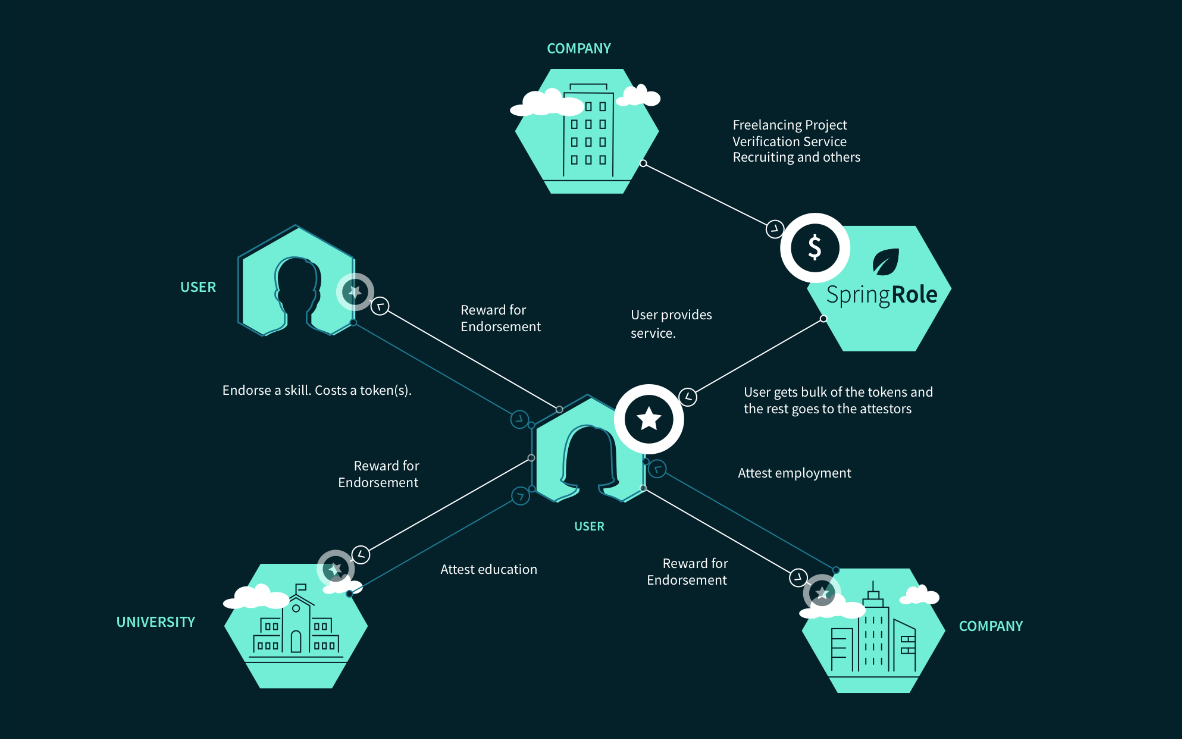 EMERGING TECH
EMERGING TECH
 EMERGING TECH
EMERGING TECH
 EMERGING TECH
EMERGING TECH
Startup incubator Science Inc. announced today the launch of California-based SpringRole Inc., which will govern the first professional reputation network using artificial intelligence and the distributed ledger technology known as blockchain.
Blockchains are widely distributed databases that use cryptography and specialized algorithms to secure the records of ongoing transactions and make historical data tamperproof. As a result, blockchain technology has been viewed as a method to provide a point of trust for documents generated between disconnected entities and a way to audit and verify those documents without revealing sensitive information.
According to the SpringRole, over 53 percent of all job applications contain inaccurate information and 34 percent of jobs come from referrals that rely on a candidate’s reputation. These numbers add up when more than 10 million new jobs a year are filled, taking an average of three to 10 days to verify fully. That leads to an average cost of $240,000 to onboard new employees. In addition, the company claims that as much as 80 percent of employee attrition can be attributed to bad hiring decisions.
SpringRole’s professional reputation network that would use blockchain capability to allow employers to verify credentials, experience and claims of employees without unduly affecting the privacy of those employees. As such, employers, educators and certification authorities would put their own claims and endorsements onto SpringRole’s blockchain in order to fill out a member’s profile and even later verify that said institution attested the way that it did. Additionally, SpringRole’s network includes mechanisms to add authority to claims and encourage trustworthy endorsements.
Software giant Microsoft Corp. and blockchain technology company Tierion Inc. have collaborated on a blockchain-based certification system that would similarly put claims or “attestations” and certifications on a blockchain network. That collaboration, however, differs from SpringRole’s effort in that the Tierion system would only be used by educators to allow certificate holders to easily prove they had received said education or certification.
“With SpringRole, we’re bringing authenticity to professional online reputation and making it possible to make money off meaningful recommendations,” said Kartik Mandaville, founder and chief executive of SpringRole.
The SpringRole blockchain would be used to give more weight to online professional reputation by providing rewards for people who make truthful endorsements. To do this, SpringRole will use the power of the blockchain to act as a single point of truth but also reward endorsers for making good and trustworthy attestations.
At its foundation, the SpringRole blockchain would network together employers and educators to secure educational and employment verification in the transaction ledger. This would allow later employers to easily verify information on user profiles without needing to do the legwork all over again each time an employee moves from job to job. The idea is to eliminate people falsifying information about their credential experience.
Mandaville said SpringRole’s blockchain is designed to give endorsements real meaning. This is done by applying a small cost to making an endorsement in the form of a cryptocurrency token associated with the SpringRole blockchain. This cost increases as people make more endorsements with the expectation this will encourage endorsers to be more cautious and selective, thus making their attestations more meaningful. Notably, endorsements from highly qualified people in relevant fields will also carry more weight.
Smart contracts, or the ability to code a transaction based on specific criteria, will be used to reward endorsers when a person is paid or hired by a company. These contracts will hold a number of tokens that power the SpringRole blockchain paid in by the company seeking to hire individuals and will be disbursed when a hire happens. As a result, instead of a finder’s fee going to an individual recruiter or headhunter, good endorsements will end up receiving money as an incentive to “invest” their attestations wisely.
SpringRole also intends to allow members to have their work reviewed by third-party professionals and receive endorsements from outside the network. The expectation that this sort of endorsement-by-work will lead to a network of attestation by “what you know” instead of “who you know.”
Although the blockchain will help secure endorsements and credential documents about members, it does not provide a strong method for curating and matchmaking. As a result, SpringRole has also implemented an artificial intelligence system to power a built-in professional reputation network search algorithm.
Employers can list a job role with SpringRole and its AI system will find the best candidate based on skills and experience required. Because the user profiles are attested to through a blockchain system, the company claims, potential employees retrieved can be trusted to have good credentials, employment records and endorsements.
SpringRole hopes this system will ease the aforementioned time it takes to verify a new employee, reduce the costs with doing legwork to contact previous employers, references and educators and simply provide a better way to vet employees.
Employers and members interested in SpringRole’s blockchain professional reputation network can find out more information on the company’s website.
THANK YOU